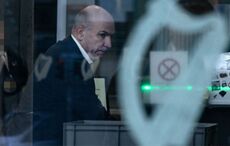The bogus immigration lawyer who scammed numerous Irish undocumented out of hundreds of thousands of dollars will serve 20 years in prison, a judge determined in a Connecticut court recently.
Ralph Cucciniello, 56, over the course of a year and a half conned more than 60 immigrants from nine countries, although most of them were Irish, into believing he was a respectable lawyer running an immigration clinic at the Yale Law School.
Cucciniello, who is being held in MacDougal-Walker Correctional Institution in Suffield, Connecticut, was charged with one count of racketeering, two counts of larceny in the first degree (over $10,000), 56 counts of larceny in the second degree ($5,000 or more) and 56 counts of fraudulently impersonating an attorney.
Cucciniello was scamming individuals out of thousands of dollars for more than 20 years, but spent very little time in jail.
The scammer fooled his victims into believing that he had discovered a loophole in the immigration system and he could get those who were undocumented green cards within the year. For this service he charged an upfront fee of $5,000.
Cucciniello was told by Superior Court Judge Richard Damiani back in January that if he came up with $300,000 in restitution for his victims his sentence would be reduced.
However, on Friday, August 29, Cucciniello came to court empty handed and was sentenced to 30 years, suspended after 20 served, for scamming $500,000 from immigrants who believed he was going to secure for them legal status.
Angered at not receiving any money back from Cucciniello, a victim from Dublin, John (not his real name), who gave the bogus attorney $15,000, told the Irish Voice on Tuesday that Cucciniello getting 20 year ins prison, "doesn't help my financial state, now, does it?"
John, like many other victims, gave Cucciniello $5,000 for his "green card" and $10,000 in back taxes.
John said he does feel, however, that the "punishment fits the crime." He said, "This guy messed with peoples lives and emotions and I'm glad in one way that justice is being served."
John said that at this stage he doesn't think that Cucciniello will pay up any restitution to his victims. "He has that money somewhere and we'll never know where," said John angrily.
Cucciniello was originally arrested on May 1, 2007 on Bleecker Street in lower Manhattan while meeting with an Irish client. He was held overnight and released the next day without bail.
He appeared before a judge at Manhattan Criminal Court a week later. He was released on bail but was later arrested on June 28 while staying at the Marriott Residence Hotel in Rhode Island, near T. F. Green Airport.
He was extradited to Connecticut on July 2.
Because the phony attorney had met with most of his clients in Connecticut, the case was referred to the New Haven State Attorney's office.
Cucciniello was arrested countless times over the years for similar frauds. He was charged in at least five different states including Washington, California, New York, New Jersey and Connecticut, but he never spent any time in prison.
Cucciniello, who was born in Patterson, New Jersey, began scamming Irish people years ago.
In 1986 Cucciniello duped Elizabeth McDermott and her mother Martha of Normandy Beach, New Jersey into thinking he was a television producer and financial analyst. He scammed them out of their life savings.
After reading letters from some of Cucciniello's victims, Damiani told the court, "I have concluded that Mr. Cucciniello's entire life was a fraud . he is an evil man."
An Irish woman, Caroline Murphy, who lived in Chicago, wrote to Damiani that she lost her fiance after she was banned from returning to the U.S. after a visit to Ireland, a visit that Cucciniello said was safe to take because she "was in the system."
"I have been left devastated and crushed by Ralph Cucciniello's actions," the letter read. "In his attempt to con innocent people out of large sums of money, he succeeded in ripping my life to pieces and ruining all of my future plans. To my fiance and friends in America, it is as if I am dead, there one day and gone the next, without any chance of saying goodbye or a farewell kiss. I may never see him again and our relationship has fallen apart," she wrote.
"Although I will never get over the loss I endured," she added, "I will feel some consolation knowing that he will never have the opportunity to inflict this level of pain on anyone else again in the future."
Although victims told the Irish Voice in the past that it seemed too good to be true, what sold the scam for them was Cucciniello's office location. He worked out of the Yale Law Library.
It was later discovered that Cucciniello's relationship with Yale professor and criminal law expert Steven Duke provided him with the contacts he needed to assume his false identity.
According to Yale, Cucciniello was a volunteer research assistant to Duke, who at the time was working on an organized crime case. Duke attended Cucciniello's sentencing.
Cucciniello's attorney, Ryan Barry, asked the court for a stay of 90 days in the case because he said he needed more time to come up with restitution money. Damiani denied Barry's request.
"You didn't come here with one red cent," Damiani said, directly to Cucciniello. "I'm not going to be one to play your game."
Damiani said he felt it was necessary to sentence the bogus attorney. He told the court full of victims and their families that by Cucciniello being sentenced it would hopefully bring them some closure.
Damiani also agreed to a request by Assistant State's Attorney John Waddock that Cucciniello not be turned over to any "outside agencies" without the Connecticut court's approval. It is presumed he was referring to Cucciniello's previous stint in the witness protection where he spent many years in the nineties after apparently saving the life of an FBI agent.
However, if Cucciniello comes up with $300,000 in the next nine months, Waddock said he has agreed to hold a hearing on a sentence of 20 years, suspended after 12 years.
An investigator with the state's attorney's office, Timothy Riordan, who gathered the evidence in the case, told reporters he was pleased with its outcome.
"My grandfather was an illegal Irish immigrant so I was happy to help out those who were trying to make a better life for themselves," Riordan said.




Comments